Local News
Ben Carr explains comments he made about Israeli Prime Minister Netanyahu
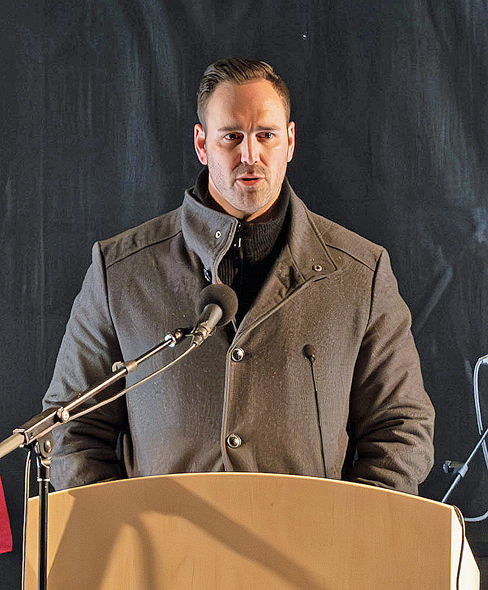
On January 29 a conference was held in Jerusalem titled “Settlement Brings Security.” Although the conference was not organized by the Israeli government per se, 12 members of the ruling right-wing coalition government of Israel were in attendance, including two cabinet ministers: National Security Minister Itamar Ben Gvir and Finance Minister Bezalel Smotrich.
At the conference strong support was given to rebuilding Jewish settlements in Gaza and the northern part of the occupied West Bank. Ben Gvir has also called for the forced resettlement of Palestinians from Gaza to outside of Gaza.
In response to that conference, Winnipeg South Centre Liberal MP Ben Carr suggested publicly that it would be in the best interests of the Middle East and the world if Israeli Prime Minister Benjamin Netanyahu were to leave office.
According to a CBC report, “Carr said that he has major concerns about the Israeli government and he hopes Netanyahu will be, in his words, ‘gone sooner rather than later.’
“Carr, who is Jewish, says he does not support politicians on the far right of the spectrum in Israel who display maps of Gaza with Israeli flags.
” ‘Governments change,’ said Carr, and Israel is still an ally that has an important security role to play in the region.
” ‘It’s very, very important that we remember that governments come and governments go, and our relationships with states are deeper than the relationship that we may have with the current government in power,” he said Wednesday, January 31.
” ‘My hope is that Netanyahu will be gone sooner rather than later, because I think that’s in the best interests of everybody in the region, and I think that’s in the best interests of everybody around the world.”
” Carr also made the point that the Liberal Party is a ‘microcosm of society,’ and there are various views about the Israel-Hamas conflict within his caucus.”
“Throughout the conflict, a handful of Liberal MPs, including Carr, have been vocal about their opinions on Canadian government policy — and not always aligned with it.
” ‘It makes sense that these conversations are happening and I don’t think that it’s a source of negativity or division,’ Carr said.”
On Monday, February 5, we contacted Ben Carr, asking him whether he would consent to an interview in which he could elaborate upon the criticism that he had leveled at Prime Minister Netanyahu the previous week.
Following is that interview:
Carr began by saying, “I want to start by responding, Bernie, to a point that I know some have raised – and there are often questions about whether it’s appropriate or the place of a Member of Parliament in Canada to comment on the affairs of another nation, in this case, Israel.
“What I want to say to that is that when the domestic affairs of that nation spill over into the domestic affairs of my nation, our nation, and impact those that I represent to the degree that this conflict has, I feel it is reasonable and responsible for me to lend my voice to the conversation. As I have said previously in written statements, throughout the course of this conflict, I believe that Prime Minister Netanyahu has been an obstacle to peace in the region.
“The most direct and specific examples for me, in which this has been highlighted in recent weeks, include two things: One, his refusal to accept that a two state solution is a viable path forward, even if Hamas is not the representative body at the table. And secondly, his refusal or reluctance to criticize publicly or condemn the behaviour or views being presented by those on the extreme right of the political spectrum in Israel.
“I believe that continues to pose an obstacle to a peace that is so desperately desired.”
I asked Carr whether he thought national Jewish organizations, such as CIJA or B’nai Brith “should also be leveling the same kind of criticism at the Netanyahu government?”
Carr responded: “I’m not going to give any direction to what the leadership of national organizations may want to do or choose to say about this particular issue. That’s their business, not mine. I am happy, as always, to engage in conversations as I have from the beginning of this conflict with the leadership of both national Jewish organizations and local Jewish organizations.
“But the opinions that I’m sharing are the opinions of a Member of Parliament who is faced with the challenges brought to me by constituents daily in regards to this conflict. So my comments are in relation to the responsibility I feel I have as a leader at the federal level for people in Winnipeg South Center.
“So my commentary is rooted in that. What national Jewish organizations want to say, or feel they should say, are decisions that rest with them, and it is certainly not my intention, or desire, or business to provide them with any guidance on that front.”
JP&N: “Have you received any feedback following the reports in the media about what you had said?”
Carr: “Anytime a Member of Parliament comments on policy publicly, and particularly when a Jewish Member of Parliament, which I am, comments publicly on an issue as divisive, challenging, and sensitive as the Middle East, there will undoubtedly be reaction from folks with varying perspectives on the issue. In this instance, I would say that I have been met with more positive and favourable reactions from folks who also believe that Prime Minister Netanyahu currently poses an obstacle to peace in the Middle East than from those who believe that he is moving the region in a direction that they would like to see.”
JP&N: “What about from among your own colleagues in the Liberal Jewish caucus? Have you had reaction from them?”
Carr: “I’m not going to share the granular details of my discussions with colleagues as much of that happens behind closed doors. However, I would say, without speaking for them, because it is not my job to speak on behalf of my colleagues, that much like the reaction I have had from constituents, the reaction from those I work with, both within the Liberal Party and beyond, has been less on the critical side of things, vis-a-vis the comments I made about Prime Minister Netanyahu.”
JP&N: “One final question: Do you plan on pursuing this course of, of trying to raise the issue how Netanyahu is an obstacle to peace, or was that your one kick at the cat, so to speak?”
Carr: ” I want to be very clear about something. The decision as to who leads the Israeli government belongs in the hands of the Israeli people. I have not suggested, and I am not now suggesting, that in any way, Prime Minister Netanyahu’s government or leadership is illegitimate. Nor do I believe that any foreign state, whether allies or not, should have a say in dictating the outcome of those elections.
“However, to the point I made earlier, I don’t believe it is unreasonable or irresponsible to lend a voice as an elected official on an issue with domestic consequences for those that I represent to comment. Bernie, I am not in Ottawa and the Member of Parliament for Winnipeg South Centre to focus only on one issue.
“There are dozens of preoccupations and issues on the minds of the people I represent, inclusive of climate change, affordability, health care, reconciliation, housing, that they expect me to be advocating for and representing their interests on in Ottawa. The Middle East is an issue that I am confronted with.
“It’s a serious issue. It’s a challenging issue. It’s a divisive and sensitive issue. My work will continue to be focused on representing a wide array. of the issues that matter to people in Winnipeg South Center. So, so far as my commentary regarding the conflict in the Middle East is concerned on principle, when I feel or where I feel people expect or deserve to hear from me, I will speak up and lend my voice.
“However, the issues facing the Middle East at the moment do not occupy the only piece of real estate in my mind or in my energy as it is concerned to the work I undertake as a Member of Parliament.”
Local News
New Israeli restaurant opens in River Heights

By BERNIE BELLAN (July 6, 2025) It’s been a long time since our community has been able to welcome the opening of a restaurant that specializes in Israeli food.
That void is now going to be filled with the opening of The Green Falafel, at 1833 Grant (corner of Centennial – next to the Subway).
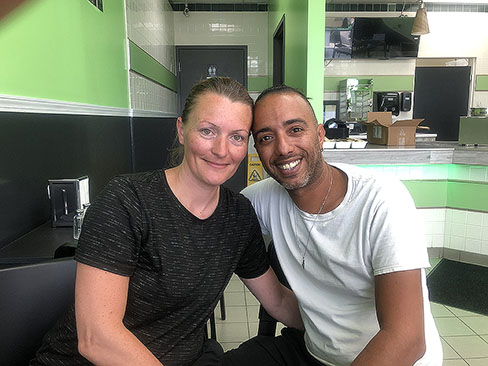
The restaurant is the fulfillment of a dream long held by the husband and wife team of Ariel and Eden Maudi, who have been living in Winnipeg the past 11 years.
Ariel, who was born in Israel and grew up in Beer Sheva, says that he worked in telecommunications in Ramat Gan for several years. He adds though that he had always dreamed of owning his own falafel stand in Israel, but life was difficult there and he decided to come to Canada as a tourist to see whether there were any opportunities here for him, Eden and their two young children.
Eden, who was born in Russia and moved to Israel with her family in 1996, stayed behind with the two kids, who were both pre-schoolers, while Ariel tested the waters in Canada first.
Ariel says he came to Canada as a tourist in 2013. His first stop was in Toronto, where he acquired his 1st class driver’s license. At the end of 2013 he moved to Winnipeg where he began working as a truck driver. Soon he found himself employed as a successful sales person at Vickar Nissan where, he says, he once achieved the status as the top car sales person in Canada. After working at Vickar Nissan for a number of years, Ariel began working as an installer for Bell MTS.
Meanwhile, Eden began working at a Walmart, later at the Costco on Regent.
But, when the opportunity to move into a space that had been previously occupied by another restaurant, but which had closed, became available, Ariel and Eden decided to open their own Israeli restaurant in an area that hadn’t seen Israeli food served since the controversial closure of Bermax Café in 2019.
The Maudis say that they will be serving a variety of Israeli dishes – all vegetarian, and that they will be fully kosher.
The “green” in Green Falafel, by the way, Ariel Maudi explains, comes from the cilantro and parsley that are added to the chickpeas. In addition, their pitas will be coming from Israel and will be baked fresh daily.
The Green Falafel will be open from 10-8 daily. Delivery will be available through Uber Eats and DoorDash.
Call 204-557-7837 for information.
Local News
Previews of shows with Jewish performers at this year’s Fringe Festival July 16-27

For show dates and venues go to winnipegfringe.com
By BERNIE BELLAN As has been our custom for many years now we try to find shows that have either Jewish performers or themes that would have particular appeal for Jewish audiences. Many of the Jewish performers at this year’s festival have been here before, but several are new. In no particular order here are blurbs about the shows we’ve found that fit the criteria I’ve just described. (By they way, if we’ve omitted a show that should be included in our list there’s plenty of time to get added to this post. Just drop me a line at jewishp@mymts.net.)

You’ve Been Served: A One-Woman Show About Divorce, Cults, and Coming of Age at Midlife
Noemi Zeigler
You are hereby summoned… to laugh, cry, and maybe belt out a Streisand number in solidarity. You’ve Been Served is a raw and riotous solo comedy by writer-performer Noemi Zeigler. It all begins when Noemi is served divorce papers on top of a garbage bin lid while taking out the trash—an undignified start to a full-blown midlife unraveling.
At 50, still clinging to her dream of becoming a singer, she falls under the spell of a music producer slash self-help guru, joins a spiritual cult, and, instead of landing a record deal, she lands in jail. Behind bars, with help from her long-buried inner child, she begins to reclaim her voice and her power. Turns out, dreams really do come true—just not the way she expected.
The show features vividly drawn characters—including a manipulative cult leader, a toxic ex-husband, and a jail guard named Roach who shares Noemi’s obsession with the fashion of Charlie’s Angels (the ‘70s TV version, of course.)
With salsa dancing, twerking, and a belting rendition of Don’t Rain on My Parade, Zeigler dives into abandonment, reinvention, and self-rescue. As she confronts perimenopause, she discovers it’s not the end—it’s the new puberty. The show touches on grief, sexuality, and spiritual confusion, but Noemi’s childlike optimism asks: What if your breakdown is actually your breakthrough?
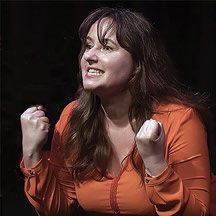
You’re good for nothing… I’ll milk the cow myself
Written & Performed by Natacha Ruck
France, 1981: The first socialist president is about to be elected and young Natacha is ready to implement her own political platform. But first, she has to take down the schoolyard bully,emasculate the rules of French grammar and make off with grandmother’s chocolate.
If you think you know the limits of Jewish mothers, evil grandmothers and transcontinental lovers, meet Natacha Ruck’s family. This true tale of three generations of women, facing three world wars, is equal parts hilarious, shocking and zany.

A One Human Being, Potentially Comedic Performance of Beauty and the Beast NEW WORK!
Written & Performed by Alli Perlov
Be our guest! Local high school drama teacher Alli Perlov is back for a tale as old as time. Can she sing? Not really. Can she act? That’s debatable. Will you laugh? Oh… probably.
Perlov plays dozens of characters, some human, some animal, and many objects, in a comedic exploration of Beauty and the Beast.
In an homage to this brilliant musical adventure, through witty commentary and unstoppable energy, Perlov aims to entertain an audience that isn’t forced to be there like her students.

Hockey Sticks and Beaver Pie
Written & Performed by Melanie Gall
Take a trip around Manitoba. From the 30,000 ft. St. Adolphe snow maze to the Narcisse snake dens! After all, where else holds both the title of Slurpee Capital of the World and the Guinness Record for the most people simultaneously howling like wolves?
Deanna Durbin, Terry Jacks and Burton Cummings are among the many homegrown stars, and Hockey Sticks features their music along with original songs and the stories that make this province unique.
Starring Melanie Gall from past shows Piaf & Brel, Ingenue and Toast to Prohibition
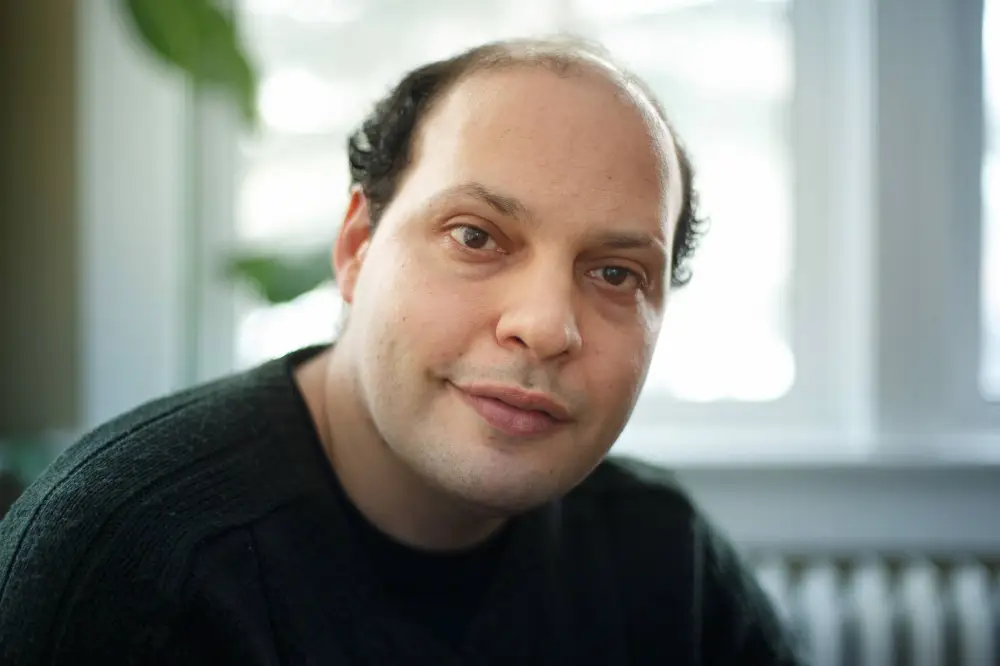
Nerohilarity Exposed
Produced by Adam Schwartz
We all sometimes feel exposed, whether that’s as a fraud or a pretender.
The performers of the award-winning Neurohilarity show, Danielle Kayahara (Laugh Out Loud CBC), Carole Cunningham (Yuk Yuks, The Debaters), Adam Schwartz (Winnipeg Fringe) and Rollin Penner (Yuk Yuks, CBC, Rumors, Winnipeg Comedy Festival), apply a comedic spin to the experiences that make us feel insecure, stripping away the emotional weight with nittygritty jokes and stories that will have you laughing uproariously.
Brilliantly awkward.
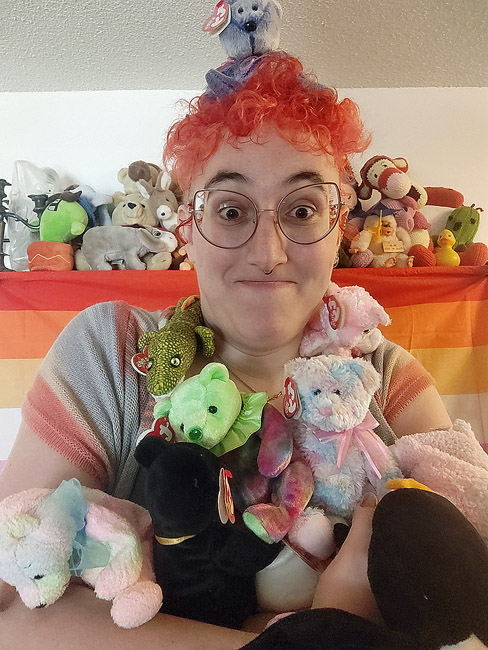
A Lesbian in the Kitchen
Willow Rosenberg
Professional lesbian Willow Rosenberg takes you on a journey through the centuries, superstitions and tablespoons of her lifelong passion for baking in this spiritual successor to 2024’s Jenny Award-nominated A Lesbian in a Bear Store.
Whether you have a favourite spatula, bake once or twice a year, or live in constant fear of being told to “just fold it in”, this one-woman show about family, joy, tradition (but make it gay),
Judaism, comfort, home (but make it gayer*), love, chemistry and magic is for you!
*Who’re we kidding, it’s all gay!

Eleanor’s Story: An American Girl in Hitler’s Germany
Written & Performed by Ingrid Garner
(Ed. note: Although Ingrid Garner isn’t Jewish, we thought the theme of this show might have a special appeal for Jewish readers.)
Based on Eleanor Ramrath Garner’s best-selling memoir, this 16x internationally award-winning adaptation – performed by her granddaughter, Ingrid Garner – details Eleanor’s youth as an American caught in Second World War Berlin.
Punctuated with humour and accompanied by cinematic sound and video, Garner embodies her ancestors in this coming-of-age odyssey, delivering an account of war that is more relevant than ever.
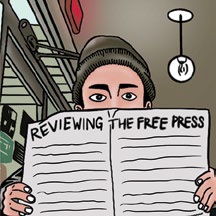
Reviewing The Free Press 2
Benji Rothman
The Winnipeg Free Press has run amok, reviewing each and every Fringe show over the past two decades without consequence or recourse. Now, it’s their turn… again.
In this refurbished work that debuted at last year’s Winnipeg Fringe, Benji Rothman once again takes the Winnipeg Free Press to task. In this (mostly) new, (hopefully) hilarious 45-minute show, Rothman dives deep into their past and exposes their faulty journalism, imbalanced reporting and, of course, embarrassing typos.
Local News
Jewish performers at this year’s Winnipeg Folk Festival July 10-13

The Black Sea Station
Long ago, there were the klezmorim, itinerant musicians who roamed the back streets of Eastern Europe, playing at parties for meals and a few coins. The sound they honed then was a visceral exploration of life’s joy, and its loss; they could whip audiences into a frenzy of dancing, or bring them to tears with the mournful wail of a clarinet. Today, Winnipeg’s own The Black Sea Station is carrying on this tradition. Featuring Daniel Koulack (bass), Victor Schultz (violin) and Myron Schultz (clarinet) — cofounders of seminal local klezmer act Finjan — along with Moldovan accordion wizard Nikolai Prisacar and multi-instrumentalist Ben Mink, the quintet transports listeners to a time and place long past. Through a mix of original songs rooted in history, and traditional tunes spun up with modern zest, they whirl through the exuberant klezmer sounds of their Eastern European heritage, tending the old ways with deep love and respect.
The Black Sea Station will be performing Sunday, July 13, at 1:00 pm in Snowberry Field.
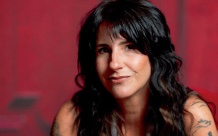
Romi Mayes
Romi Mayes has taken some hard knocks in her life, but she’s never faded away. For more than 25 years, Manitoba’s first lady of blues-rock has been a lynchpin of the Canadian roots scene. She earned that position the old-fashioned way, through her gritty, passionately emotive music. With her sizzling guitars and full-throated rasp, the Juno-nominated performer howls and purrs through razor-edged lyrics, rocking out wherever she can find a stage. She’s long been one of the hardest-working musicians on the circuit, keeping a busy slate of gigs and mentoring up-and-coming artists to get a foothold on the trails she blazed. Now, after a nine-year hiatus from the studio, Mayes has put her scintillating sound back on record with her long-awaited seventh album, Small Victories — a return that leaves no doubt, no matter the ups and downs, Mayes is here to stay.
Romi will be performing Friday, July 11, at 1:00 pm in Burr Oak.

Leonard Podolak (with Matt Gordon)
Ireland’s Matt Gordon is a fiddler and singer, whose fleet-footed clogging and thigh-slapping hambone has taken stages by storm since the 1980s. Leonard Podolak is a virtuosic master of the clawhammer banjo, who for decades has whipped up some of Manitoba’s wildest roots parties with his band, The Duhks. Put those talents together, and they can promise you this much: we’re all gonna have a real good time. Longtime friends and musical collaborators, Gordon and Podolak deliver an exhilarating trip through old-time Appalachian music. Their performances seamlessly blend intricate instrumental lines with heartfelt singing and dazzling dance. They’ve teamed up on a few records over the years, including 2020’s bigband extravaganza Power Wagon: Live At Shanley’s. But the best way to experience this duo’s toe-tapping, hand-clapping chemistry is to see it live.
Podolak and Gordon will be performing A concert with a side of clogging Sunday, July 13, at 3:00 pm in Folk School.
